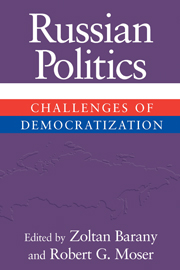Book contents
- Frontmatter
- Contents
- List of Tables and Figures
- List of Contributors
- Acknowledgments
- Introduction: Challenges of Russian Democratization
- 1 Russian Electoral Trends
- 2 Executive–Legislative Relations in Russia, 1991–1999
- 3 The Russian Central State in Crisis: Center and Periphery in the Post-Soviet Era
- 4 Russian Economic Reform, 1991–1999
- 5 Politics and the Russian Armed Forces
- Conclusion: Democracy and Russian Politics
- Index
Introduction: Challenges of Russian Democratization
Published online by Cambridge University Press: 05 June 2012
- Frontmatter
- Contents
- List of Tables and Figures
- List of Contributors
- Acknowledgments
- Introduction: Challenges of Russian Democratization
- 1 Russian Electoral Trends
- 2 Executive–Legislative Relations in Russia, 1991–1999
- 3 The Russian Central State in Crisis: Center and Periphery in the Post-Soviet Era
- 4 Russian Economic Reform, 1991–1999
- 5 Politics and the Russian Armed Forces
- Conclusion: Democracy and Russian Politics
- Index
Summary
It has been ten years since Russia emerged from the collapse of the Soviet Union with a leadership of self-proclaimed democrats committed to radical transformation away from communism toward democracy and a market economy. Despite, or perhaps because of, the ambitious program and high hopes of its leaders, Russia's dual transition of democratization and market reform has been a grave disappointment.
The list of failures is daunting. Although Russia now possesses the trappings of democratic governance – constitutionally guaranteed individual freedoms, an emerging multiparty system, competitive elections – consolidated democracy seems no closer now than it had been at the beginning of the process. In fact, in areas such as the freedom of the press, development of civil society, and protection of human rights, Russia has lost ground since 1991. Transformation of the command economy has been an even greater failure. More than ten years of market reform (counting the Gorbachev period) have produced periods of hyperinflation, the collapse of the currency, and chronic nonpayment of wages and pensions.
If this is not enough, Russia's post-communist development has also spawned pervasive crime and corruption, a bloody war of secession in Chechnya, and the collapse of basic social services and infrastructure. Wherever one looks, Russia seems to be facing intractable problems that threaten the ability of the elected to govern at all, making the establishment of a consolidated democracy and functional market economy seem like increasingly unrealizable goals.
- Type
- Chapter
- Information
- Russian PoliticsChallenges of Democratization, pp. 1 - 18Publisher: Cambridge University PressPrint publication year: 2001



